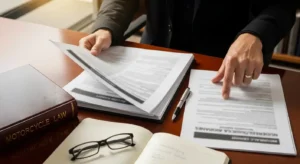Filing a motorcycle accident claim is a crucial step toward recovering the costs of medical bills, lost income, property damage, and pain and suffering after a crash. The process is rarely simple—minor errors can lead to denied claims or settlements that fall far short of your actual losses. Insurance companies use every detail against you, making it essential to avoid common mistakes during filing.
This guide breaks down the common mistakes to avoid when filing a motorcycle accident claim, equipping you with practical strategies to protect your rights.
You’ll discover:
- Why prompt action and accurate documentation matter
- How to handle insurance adjusters and legal deadlines
- Tactics for preserving evidence and maximizing compensation
By understanding both the pitfalls and best practices, you increase your chances for a fair outcome when navigating the aftermath of a motorcycle accident.
Understanding Motorcycle Accident Claims
 Navigating the motorcycle accident claims process requires clarity on what’s involved and what’s at stake. At its core, a motorcycle accident claim is a formal request for compensation filed by an injured rider or passenger after a collision. This process covers a range of losses and damages that can result from an accident.
Navigating the motorcycle accident claims process requires clarity on what’s involved and what’s at stake. At its core, a motorcycle accident claim is a formal request for compensation filed by an injured rider or passenger after a collision. This process covers a range of losses and damages that can result from an accident.
Common types of damages in injury claims include:
- Medical expenses: Hospital bills, emergency care, ongoing therapy, prescription medications, and future medical treatments.
- Property damage: Costs to repair or replace your motorcycle, as well as damaged riding gear or other personal property.
- Pain and suffering: Compensation for physical pain, emotional distress, reduced quality of life, and trauma experienced due to the crash.
Insurance companies are central players in this process. They assess liability, review documentation, negotiate settlements, and often attempt to minimize payouts. Legal frameworks—such as state laws governing fault, statutes of limitations, and comparative negligence—shape how compensation for motorcyclists is determined. These rules dictate who pays for what portion of damages and how much you may recover based on your role in the accident.
A clear understanding of these elements helps you recognize what you’re entitled to claim and what evidence will be necessary as you move forward with your case. Each aspect impacts your ability to secure fair compensation through the motorcycle accident claims process.
1. Delaying Medical Treatment
Delays in seeking medical care after a motorcycle crash are among the most damaging mistakes in filing motorcycle accident claims. Immediate medical evaluation is critical—not just for your health, but also for the strength of your case. Insurance companies scrutinize every aspect of an injury claim. If you wait to see a doctor, they may argue that your injuries were not serious or weren’t caused by the accident at all.
Why Immediate Medical Attention Matters
Your health comes first. Some injuries, like concussions or internal bleeding, are not always obvious right away. Untreated symptoms can worsen rapidly.
Early treatment creates official records. Medical reports serve as evidence of your injuries and their direct connection to the accident.
How Delays Can Undermine Your Claim
- Insurers often use gaps in treatment as a reason to deny or undervalue claims.
- Any delay can be interpreted as a sign that your injuries were minor or unrelated.
- The absence of prompt documentation makes it harder for your attorney to prove damages.
Tips for Getting Timely Medical Care
- Visit an emergency room or urgent care facility immediately, even if you feel fine initially.
- Follow up with your primary physician and any recommended specialists.
- Keep detailed records of every appointment, diagnosis, and prescribed treatment.
- Photograph visible injuries as soon as possible; these images help validate your injury documentation.
- Swift action not only protects your physical well-being but also strengthens your legal position if disputes arise about the true extent and cause of your injuries. This step sets a solid foundation for every part of the motorcycle accident claim process.
2. Failing to Notify Law Enforcement
Reporting the accident to law enforcement is a crucial step that many riders overlook in the chaos following a crash. A police report serves as an official record, capturing key facts, witness statements, and the circumstances surrounding the incident. Insurance companies rely heavily on this documentation to validate claims—without it, your case may appear weaker or even suspicious.
Skipping this step creates gaps in injury documentation and can make it easier for insurers to dispute your account of events. Always call the police, no matter how minor the collision seems, to ensure accurate accident reporting and establish a solid foundation for your claim.
3. Admitting Fault or Making Statements Without Legal Advice
Saying too much at the accident scene or to insurance representatives is one of the most critical mistakes in filing motorcycle accident claims. Insurance companies often use your words against you, especially if you admit fault or make statements that could be interpreted as taking blame. Even casual comments like “I’m sorry” can be misconstrued as an admission of fault.
- Avoid discussing the details of the accident or who was at fault with anyone other than your attorney.
- Let your lawyer handle communications with insurers and other parties.
- Stick to the facts when speaking to police—avoid speculation or opinions.
Protecting your rights starts by limiting statements and ensuring every word is legally sound.
4. Not Collecting Adequate Evidence at the Scene
Neglecting thorough accident evidence collection ranks high among the common mistakes to avoid when filing a motorcycle accident claim. Immediate, clear documentation preserves crucial details that insurance companies and courts rely on.
Prioritize gathering:
- Photos of the accident scene: Capture damage to all vehicles, road conditions, weather, skid marks, debris, and traffic signs.
- Injury documentation: Photograph visible injuries and torn clothing for medical records.
- Contact information: Gather names and statements from witnesses and all other parties involved.
- Hazard identification: Note hazards like potholes, oil spills, or obstructed signage.
Missing these steps can make it difficult to prove fault or document the true extent of losses—mistakes in filing motorcycle accident claims usually start here.
5. Speaking Directly with Insurance Adjusters Without an Attorney
Insurance adjusters are trained to protect their company’s interests, often seeking ways to minimize payouts or find inconsistencies in your claim. Negotiating alone puts you at risk of undervaluing your injuries or agreeing to settlements that don’t reflect the full impact of the accident.
Common mistakes in filing motorcycle accident claims include:
- Providing incomplete injury documentation
- Poorly explaining delayed medical care
- Making statements that can be used against you later
Having an attorney manage communications means every conversation is strategic. They know how to present evidence, counter low offers, and prevent adjusters from exploiting technicalities or gaps in your claim.
6. Accepting Initial Settlement Offers Too Quickly
Insurance companies often present fast settlement offers that seem tempting, especially when bills are piling up after an accident. These initial offers usually undervalue your true losses—missing out on compensation for long-term medical care, pain and suffering, or future lost wages. Accepting too soon is one of the most common mistakes in filing motorcycle accident claims.
Always review any settlement offer with an experienced attorney before signing anything. A lawyer can evaluate the full scope of your injuries, review your injury documentation, and ensure you aren’t giving up compensation you’re entitled to for the sake of convenience.
7. Destroying Evidence Prematurely by Repairing the Motorcycle Too Soon
 Rushing to repair your motorcycle right after an accident is one of the most common mistakes in filing motorcycle accident claims. Early repairs erase vital evidence—such as the pattern of damage, point of impact, and any contributing mechanical failures—that can strengthen your case. Insurance adjusters and legal teams rely on photographic proof, physical inspection, and injury documentation to assess fault and damages.
Rushing to repair your motorcycle right after an accident is one of the most common mistakes in filing motorcycle accident claims. Early repairs erase vital evidence—such as the pattern of damage, point of impact, and any contributing mechanical failures—that can strengthen your case. Insurance adjusters and legal teams rely on photographic proof, physical inspection, and injury documentation to assess fault and damages.
Here’s what you should do instead:
- Preserve your bike in its post-accident condition until all necessary evidence is collected.
- Take detailed photos from multiple angles, document all visible damage, and secure written estimates before moving forward with any repairs.
- Confirm with your attorney or insurer that you have everything needed to avoid jeopardizing your claim.
Preserving evidence protects your right to fair compensation and prevents common pitfalls riders face during the claims process.
8. Missing Legal Deadlines (Statute of Limitations)
Each state sets strict deadlines—known as the statute of limitations—for filing a motorcycle accident claim. Missing these deadlines is one of the most critical mistakes in filing motorcycle accident claims, often resulting in your case being dismissed outright, regardless of its merits.
For example:
- Louisiana imposes a one-year rule from the date of the accident to file your claim
- Other states may allow up to two or three years
Tracking these dates is crucial; failing to act on time erases your right to compensation for medical expenses, property damage, and injury documentation. Always confirm your state’s specific timeline and begin your claim process as early as possible.
9. Ignoring Comparative Fault Rules in Your State
Comparative fault laws directly impact your payout in a motorcycle accident claim. If you share any responsibility for the crash, your compensation is reduced by your percentage of fault. For example:
- If you’re found 20% at fault and the damages total $50,000, you would only recover $40,000.
- Some states bar recovery if your fault exceeds 50%, while others allow reduced compensation no matter your share.
Failing to understand these rules is a common mistake in filing motorcycle accident claims. Knowing how comparative fault works helps riders avoid surprises that can undermine their compensation and emphasizes the importance of accurate injury documentation and legal strategy.
10. Not Hiring a Motorcycle Accident Attorney
Relying on your own judgment during the claims process often leads to overlooked details, missed deadlines, or incomplete injury documentation. A motorcycle accident lawyer uncovers liable parties you may not have considered, collects vital evidence, and calculates every loss—medical bills, lost wages, and pain and suffering. Attorneys understand the common mistakes to avoid when filing a motorcycle accident claim, such as delayed medical care or missing key paperwork. They ensure filings meet legal requirements and deadlines, reducing errors that jeopardize your claim. The right legal partner increases your odds of securing maximum compensation while minimizing exposure to common pitfalls in the process.
Conclusion
Knowing the common mistakes to avoid when filing a motorcycle accident claim can make the difference between a denied payout and receiving fair compensation. Taking immediate action, from seeking medical care to gathering evidence and consulting an attorney, gives you the leverage needed against insurance tactics and legal hurdles.
- Timely medical treatment secures your health and claim.
- Accurate documentation preserves critical proof.
- Legal guidance ensures full protection of your rights.
Insurance companies have entire teams dedicated to minimizing what they pay out. You deserve the same level of advocacy on your side. By steering clear of these frequent missteps, you put yourself in the strongest position to recover physically, emotionally, and financially after a motorcycle accident. If you’re unsure at any step, reaching out for professional legal support is often the best next move.
